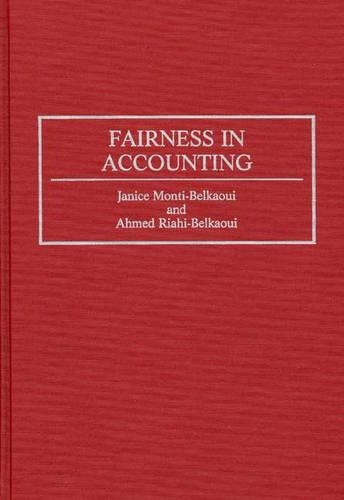
Fairness in Accounting
(Hardback)
Publishing Details
Fairness in Accounting
By (Author) Ahmed Riahi-Belkaoui
By (author) Janice Monti-Belkaoui
Bloomsbury Publishing PLC
Praeger Publishers Inc
16th February 1996
United States
Classifications
Tertiary Education
Non Fiction
657
Physical Properties
Hardback
192
Description
Auditor's reports declare that the financial statements contained in them present fairly the results of operations and cash flows, in conformity with generally accepting accounting principles. Users of accounting information are guaranteed that the auditors have attempted to be fair in their presentation - but what does this actually mean, and are there other ways in which the fairness concept comes into play Monti-Belkaoui and Riahi-Belkaoui explore these matters in concise, readable detail, not only for their colleagues in the academic community but for professionals in accounting firms as well.
Reviews
The authors expand the issue of fairness in accounting beyond the traditional view of 'presented fairly in conformity with GAAP' to include fairness in distribution of accounting information, nontraditional disclosure needs, and intrafirm disclosure requirements... Chapters 2 3, and 4 examine fairness in the distribution of accounting information (neutrality), fairness in the extent of disclosure neccessary, and fairness in intrafirm reporting and its impact on managerial behavior. Several philosophical concepts of distributive justice are applied to accounting, such as social justice, liberty, economic entitlement, right to well-being, freedom, opportunism, and enw forms of accounting (value added, social, and human resources). These three chapters should be required reading for Financial Accounting Standards Board members, SEC commisioners, and other rule setters.-Choice
"The authors expand the issue of fairness in accounting beyond the traditional view of 'presented fairly in conformity with GAAP' to include fairness in distribution of accounting information, nontraditional disclosure needs, and intrafirm disclosure requirements... Chapters 2 3, and 4 examine fairness in the distribution of accounting information (neutrality), fairness in the extent of disclosure neccessary, and fairness in intrafirm reporting and its impact on managerial behavior. Several philosophical concepts of distributive justice are applied to accounting, such as social justice, liberty, economic entitlement, right to well-being, freedom, opportunism, and enw forms of accounting (value added, social, and human resources). These three chapters should be required reading for Financial Accounting Standards Board members, SEC commisioners, and other rule setters."-Choice
Author Bio
JANICE MONTI-BELKAOUI is Professor of Sociology at Rosary College, River Forest, Illinois, and Chair of the Department of Sociology, History, and American Studies./e She writes frequently for scholarly journals and is coauthor of Accounting in the Dual Economy (Quorum, 1991). AHMED RIAHI-BELKAOUI is Professor of Accounting at the College of Business Administration, University of Illinois at Chicago. At last count, he has published more than 100 articles in various refereed journals and other publications and authored or coauthored more than 24 academic and professional books for Quorum.
